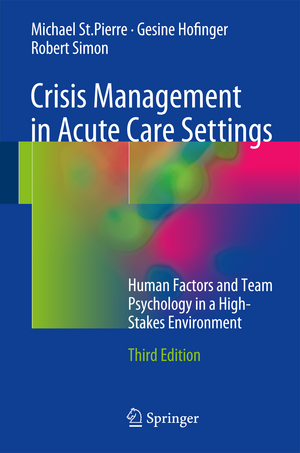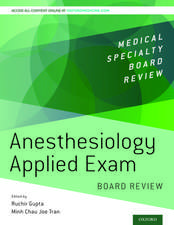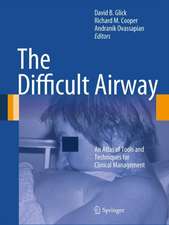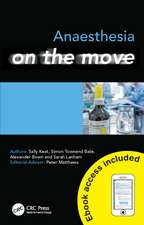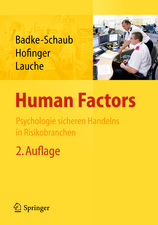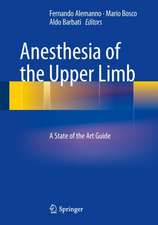Crisis Management in Acute Care Settings: Human Factors and Team Psychology in a High-Stakes Environment
Autor Michael St Pierre, Gesine Hofinger, Robert Simonen Limba Engleză Hardback – 17 noi 2016
| Toate formatele și edițiile | Preț | Express |
|---|---|---|
| Paperback (1) | 1183.91 lei 38-44 zile | |
| Springer International Publishing – 27 iun 2018 | 1183.91 lei 38-44 zile | |
| Hardback (1) | 1454.78 lei 38-44 zile | |
| Springer International Publishing – 17 noi 2016 | 1454.78 lei 38-44 zile |
Preț: 1454.78 lei
Preț vechi: 1531.34 lei
-5% Nou
Puncte Express: 2182
Preț estimativ în valută:
278.40€ • 288.89$ • 232.70£
278.40€ • 288.89$ • 232.70£
Carte tipărită la comandă
Livrare economică 11-17 martie
Preluare comenzi: 021 569.72.76
Specificații
ISBN-13: 9783319414256
ISBN-10: 3319414259
Pagini: 434
Ilustrații: XXII, 433 p. 65 illus., 52 illus. in color.
Dimensiuni: 155 x 235 x 23 mm
Greutate: 8.02 kg
Ediția:3rd ed. 2016
Editura: Springer International Publishing
Colecția Springer
Locul publicării:Cham, Switzerland
ISBN-10: 3319414259
Pagini: 434
Ilustrații: XXII, 433 p. 65 illus., 52 illus. in color.
Dimensiuni: 155 x 235 x 23 mm
Greutate: 8.02 kg
Ediția:3rd ed. 2016
Editura: Springer International Publishing
Colecția Springer
Locul publicării:Cham, Switzerland
Cuprins
Part I Basic Principles: Error, Complexity, and Human Behavior.- The Human Factors: Errors and Skills.- The Challenge of Acute Healthcare.- The Nature of Error.- The Psychology of Human Action.- Part II Individual Factors of Behavior.- Human Perception: The Way We See Things.- Information Processing and Mental Models: World Views.- Goals and Plans: Turning Points for Success.- Attention: The Focus of Consciousness.- Stress.- Strategies for Action: Ways to Achieve Good Decisions.- Part III The Team.- The Key to Success: Teamwork.- Speech Is Golden: Communication.- Leadership.- Part IV Error and Safety in Organizations.- Organization, Errors, and Safety.- Strategies for Patient Safety.- Learning for Safety.
Recenzii
“This is the third edition of a book that reviews in excellent and necessary detail the factors behind errors and crisis management at the individual, team, and organizational levels in acute care. … This book can be highly recommended as a must-read for all members of the medical team. … the book in its entirety gives a unique perspective on human psychology and individual, team, and organizational factors that interact to lead to successful or unsuccessful management of emergent situations.” (Kristin Colling, Doody's Book Reviews, October, 2017)
“Crisis Management in Acute Care Settings: Human Factors and Team Psychology in a High-Stakes Environment represents a comprehensive overview of the entire field of human factors and safety theory as applied to patient safety in acute care settings … . This book is therefore an excellent and accessible read for those who want to refresh their existing knowledge of patient safety, or for those who want to begin in this expanding area of research and practice.” (Craig S. Webster, Vol. Anesthesia & Analgesia, Vol. 125 (3), September, 2017)
“Crisis Management in Acute Care Settings: Human Factors and Team Psychology in a High-Stakes Environment represents a comprehensive overview of the entire field of human factors and safety theory as applied to patient safety in acute care settings, but importantly, it retains an applied clinical focus throughout. … an excellent and accessible read for those who want to refresh their existing knowledge of patient safety, or for those who want to begin in this expanding area of research and practice.” (Craig S. Webster, Anesthesia & Analgesia, Vol. 125 (3), September, 2017)“Crisis Management in Acute Care Settings: Human Factors and Team Psychology in a High-Stakes Environment represents a comprehensive overview of the entire field of human factors and safety theory as applied to patient safety in acute care settings … . This book is therefore an excellent and accessible read for those who want to refresh their existing knowledge of patient safety, or for those who want to begin in this expanding area of research and practice.” (Craig S. Webster, Vol. Anesthesia & Analgesia, Vol. 125 (3), September, 2017)
Notă biografică
Dr. Michael St.Pierre is an anesthesiologist, Intensive Care physician and Emergency Medicine physician at the University Hospital of Erlangen, Germany. He is codirector of the Simulation Center of the Department of Anesthesiology and member of the Patient Safety Division of the German Society of Anesthesiology and Intensive Care. He has written several German textbooks on patient safety, critical incident reporting and simulation in healthcare.
Dr. Gesine Hofinger is a psychologist working on human factors and safety. She is partner of Team HF, a human factors research and trainings association. She has more than two decades of experience with research and training in patient safety. She is author of several German textbooks on Human Factors and patient safety.
Dr. Robert Simon is an educator with more than 40 years’ experience specializing in research, development, and training for high performance, high stress teams in aviation and health care. He wasthe Principal Investigator for the MedTeams program which was adopted by the US Government and disseminated internationally as TeamSTEPPS. Dr. Simon joined the Center for Medical Simulation (CMS) as Education Director in 2002 and is now Director Emeritus of the Institute. Dr. Simon is on the faculty of the Harvard Medical School, the Massachusetts General Hospital, the Institute of Health Professions and the University of Cantabria.
Dr. Gesine Hofinger is a psychologist working on human factors and safety. She is partner of Team HF, a human factors research and trainings association. She has more than two decades of experience with research and training in patient safety. She is author of several German textbooks on Human Factors and patient safety.
Dr. Robert Simon is an educator with more than 40 years’ experience specializing in research, development, and training for high performance, high stress teams in aviation and health care. He wasthe Principal Investigator for the MedTeams program which was adopted by the US Government and disseminated internationally as TeamSTEPPS. Dr. Simon joined the Center for Medical Simulation (CMS) as Education Director in 2002 and is now Director Emeritus of the Institute. Dr. Simon is on the faculty of the Harvard Medical School, the Massachusetts General Hospital, the Institute of Health Professions and the University of Cantabria.
Textul de pe ultima copertă
This book is unique in providing a comprehensive overview of the human factors issues relevant to patient safety during acute care. By elucidating the principles of human behavior and decision-making in critical situations and identifying frequent sources of human error, it will help healthcare professionals provide safer, more effective treatment when dealing with emergencies characterized by uncertainty, high stakes, time pressure, and stress. The third edition has emerged from an ongoing synergistic relationship between clinicians and behavioral scientists on both sides of the Atlantic to update and enhance each chapter -- blending the strengths of the two professions into a readily accessible text. Among other improvements, readers will find sharper articulation of concepts and significantly more information on the organizational impact on individual and team performance. Crisis Management in Acute Care Settings is the required reference for all who are learning about, teaching, or providing acute and emergency healthcare. It will be of high value for undergraduate and graduate medical and nursing program and offer a much-needed resource for those who use high-fidelity healthcare simulation to teach teamwork.
Caracteristici
Offers a thorough overview of the human factors and issues relevant to patient safety during acute care Helps healthcare professionals to provide safer, more effective treatment Examines the organizational impact on performance Represents the outcome of an ongoing synergistic relationship between clinicians and behavioral scientists on both sides of the Atlantic
